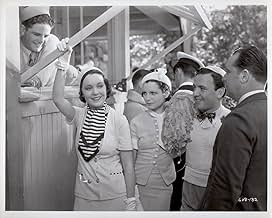अपनी भाषा में प्लॉट जोड़ेंAfter Nina Leeds finds out that insanity runs in her husband's family, she has a love child with a handsome doctor and lets her husband believes the child is his.After Nina Leeds finds out that insanity runs in her husband's family, she has a love child with a handsome doctor and lets her husband believes the child is his.After Nina Leeds finds out that insanity runs in her husband's family, she has a love child with a handsome doctor and lets her husband believes the child is his.
- पुरस्कार
- 3 जीत और कुल 1 नामांकन
फ़ीचर्ड समीक्षाएं
I guess the thing I like about this movie the most is that the suspense is like a pot of boiling water. You keep waiting for it to overflow and have a kind of epiphany when it does overflow. But the movie never gives that epiphany because Sam and Gorden never find out the truth and I think the movie is better for it.
This movie was panned back in 1932 when it came out, and I just don't get it. It's a very intelligent and emotionally moving film. I wish Hollywood of the modern era could make films like this instead of all the cardboard junk with a happy ending that they have these days.
I guess most people just don't get it. But those that do will be gratetful for films like this.
Great acting all around, especially for Norma Shearer, Clark Gable, and all the main characters. The kid Tad Alexander who played young Gordon was great. Ahh he's 77 years old now. MAN
I've never seen a Norma Shearer movie that I didn't adore. Ha, all those old Hollywood Queens are nothing compared to Norma.
"Hearing" characters express their inner thoughts via voice-over narration throughout the ENTIRE film is simply a bad idea. The pacing of every scene is destroyed, and the facial expressions displayed by the actors, to accompany their "narration," borders on parody.
This movie was produced just five years into the "sound" era, and apparently a few of the actors had not yet abandoned the silent film style of exaggerated performance.
Never have I seen a film adopt this technique, and frankly, I will never sit through another that does. "Narration" (or voice-over) is fine when used appropriately - as in almost any film noir. But in this case, the experiment fails.
Gable fares the best, as his earthy style is less inclined to be derailed by the "inner dialogues." I simply CANNOT recommend this film.
क्या आपको पता है
- ट्रिवियाWhen Maureen O'Sullivan first met Clark Gable on the set, he was in his old-age makeup. He asked her out on a horseback-riding date, but thinking he was too old for her, she turned him down. Later when she was doing some voice-overs, she saw him without makeup and regretted her decision. Gable never asked her out again.
- गूफ़After Charlie's last line, a shadow of the boom microphone can be seen moving off the back of the wicker chair before the camera starts pulling back.
- भाव
Nina Leeds: [Inner thoughts] You do love me, Ned.
Dr. Ned Darrell: [Inner thoughts] I don't love you.
Charlie Marsden: [Inner thoughts] Darrell and Nina. There's something unnatural here. Love and hate and lust! Where's Sam? Why isn't he here? I hate Nina! I must punish her!
- कनेक्शनReferenced in Hollywood Hist-o-Rama: Norma Shearer (1962)
- साउंडट्रैकSymphony No.5 in E Minor, Op.64
(1888) (uncredited)
Written by Pyotr Ilyich Tchaikovsky
Excerps from the second movement played during the opening credits
टॉप पसंद
- How long is Strange Interlude?Alexa द्वारा संचालित
विवरण
- रिलीज़ की तारीख़
- कंट्री ऑफ़ ओरिजिन
- भाषा
- इस रूप में भी जाना जाता है
- Slobodna ljubav
- फ़िल्माने की जगहें
- उत्पादन कंपनी
- IMDbPro पर और कंपनी क्रेडिट देखें
बॉक्स ऑफ़िस
- बजट
- $6,54,000(अनुमानित)
- चलने की अवधि
- 1 घं 49 मि(109 min)
- रंग
- पक्ष अनुपात
- 1.37 : 1



















